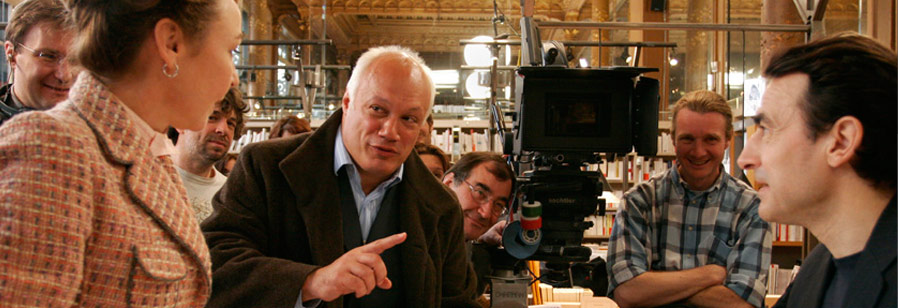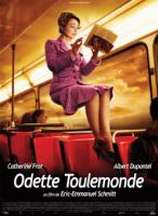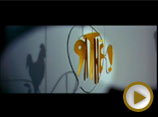Summary
Eric-Emmanuel Schmitt’s first film is a comedy about happiness.
After huge success with French-speaking audiences (ticket sales reached 950,000 in France and Belgium), it has been received with the same enthusiasm in other countries – Spain, Germany, Italy, Turkey and Japan, to name but a few.
On the face of it, Odette Toulemende has nothing to be happy about but is; Balthazar Balsan has everything to be happy about but isn’t! An awkward forty-something, with a delectable son who works as a hairdresser, a daughter lumbering her way through adolescence and a host of mischievously sketched characters in the background, Odette works on the cosmetics counter of a department store by day and sews feathers on to Parisian cabaret costumes by night. She dreams of being able to thank Balthazar Balsan, her favourite author, to whom she thinks she owes her optimism. Affluent and attractive, the Parisian writer turns up unexpectedly in her life…
A story about a colourful encounter between misfits who have nothing in common…
Comments
Le Soir - « A prolific author makes his cinema début with a film of striking originality. »
 Eric-Emmanuel Schmitt’s books have been translated into 35 languages and his plays are regularly performed in over 40 countries – Oscar and The Lady in Pink, to name but one. Acclaimed by critics and audiences alike, Schmitt is without doubt one of the most read and produced authors writing in French today. Even the cinema has taken up his books, witness Monsieur Ibrahim and The Flowers of The Koran, a film by François Dupeyron with Omar Sharif in the title role. Now Schmitt himself is turning his talents to film, a natural move for one of unlimited powers of invention. The cinema first caught his imagination when he saw Merlin the Magician. Then followed Cocteau’s films at 15. ‘From that moment on, I knew that cinema was an artform with a marvellous capacity for putting across certain stories. I was blown away by Orphée and Beauty and the Beast,’ he says.
Eric-Emmanuel Schmitt’s books have been translated into 35 languages and his plays are regularly performed in over 40 countries – Oscar and The Lady in Pink, to name but one. Acclaimed by critics and audiences alike, Schmitt is without doubt one of the most read and produced authors writing in French today. Even the cinema has taken up his books, witness Monsieur Ibrahim and The Flowers of The Koran, a film by François Dupeyron with Omar Sharif in the title role. Now Schmitt himself is turning his talents to film, a natural move for one of unlimited powers of invention. The cinema first caught his imagination when he saw Merlin the Magician. Then followed Cocteau’s films at 15. ‘From that moment on, I knew that cinema was an artform with a marvellous capacity for putting across certain stories. I was blown away by Orphée and Beauty and the Beast,’ he says.
For the past few weeks, this story-teller sans pareil has swapped pen for camera to shoot a film about happiness in Charleroi, on the North Sea coast, and in Brussels and Paris. The budget: 9 million euros. A Franco-Belgian coproduction with Anne Dominique Toussaint on the Belgian side, the film stars Catherine Frot and Albert Dupontel as the lead couple and boasts an original plot: "It’s the story of a writer who has everything to be happy about but is incapable of happiness, and a shop assistant who has nothing to be happy about but who is adept in the art of happiness!" says the author.
At the Money Studios just outside Brussels, Albert Dupontel, flushed with success from Enfermée Dehors, (700,000 French viewers), is savouring a sense of irresponsibility on the set. "The mental pressure just isn’t the same. When I’m directing, I’m building, but here, I’m being built. I get a guilty pleasure out of acting. I play a fragile writer, and I find the sensitivity quite difficult because I can be quite a private person. This is nothing like my usual clowning."
There’s an atmosphere of general enjoyment. Joséphine Baker’s Chiquita Madame is playing in repeat mode. The set is inside a fisherman’s house. At a table, Dupontel is covering a notebook with ink while Catherine Frot is swaying to the music. The whole crowd is won over by the prevailing mood of fun. The dancing looks improvised but requires precision and rehearsals.
Catherine Frot confides: "I’m terrible at analyzing my work. I’m really enjoying playing Odette. She’s a sweet character with lots of energy. I find her escapist side very endearing and it brings me closer to her. Albert and Odette are an unlikely couple. They make an interesting contrast.
His desperate moods and my cheerful positivity create this wonderful array of shades of feeling."
In the midst of it all, Eric-Emmanuel Schmitt is managing the two cameras; he studies the video screen then comes back to Catherine Frot and mimes a move, a dance step. It seems to suit him being at the heart of the action. Catherine Frot whispers, "He’s a very warm person and extremely generous. There’s something almost amateurish about him: he’s so full of enthusiasm for it all and just loves sharing his enjoyment. He’s a stickler about emotions, though, and I like that. You don’t always get proper guidance but he’s right there when you need him: he knows what he wants to tell and why. He had a story he wanted to film and he was looking for something like a show. His film is full of references to the shows and to fantasy in a humdrum world." Albert Dupontel agrees: "He takes a microscope to our psychologies. He’s very sensitive to looks, emotions, energies. He knows the inner workings of his characters inside-out. Which makes him demanding about sticking to the rules. His filming techniques are relatively simple because he’s centred on directing the actors. But he’s not obsessive about his script, and that’s a mark of intelligence."
Fabienne Bradfer
La Libre Match - « Loving comedy »
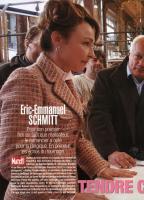
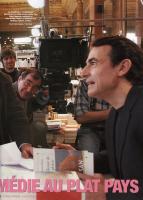
Eric-Emmanuel Schmitt has chosen to shoot his first film in Belgium. We bring you a few pre-release impressions.With his amazing line-up of bestsellers, Schmitt has already devised the script for the film adaptations of his books The Libertine (directed by Gabriel Aghion) and Monsieur Ibrahim and the Flowers of the Koran (François Dupéron).
Odette Toulemonde, his first full-length screenplay, is set in Belgium. Filming is due to take ten weeks with completion in June, and the film will be out in January or February 2007. Key scenes include an encounter – not a first but a formative – between the hero and heroine, the Parisian writer Balthasar Balsan alias Dupontel and his number-one fan, Odette, played by Catherine Frot. Belgian cinema, so says Schmitt, is in its infancy, and it is precisely its youth and freshness that he likes about it.
Le Parisien - « Eric-Emmanuel Schmitt directs this funny couple »
An administrative building in Paris with sweeping views over the Ile Saint Louis and a dizzying panorama of the French capital. In a vast office high up on the 15th floor, Eric-Emmanuel Schmitt is filming the last sections of his first full-length film, Odette Toulemonde, a love story starring Catherine Frot and Albert Dupontel, to appear in February 2007. The scene consists of a stormy argument between the film’s hero, bestselling author Balthazar Balsan (Albert Dupontel), and his editor (Alain Doutey).
No sign of tension among the technicians. Gazing intently at the monitor screen, attentive to the smallest move, the ‘young’ filmmaker directs his crew without raising his voice. The actors follow each direction in turn. In just two retakes, the scene is in the bag. ‘It’s almost sad,’ laughs Eric-Emmanuel Schmitt during the lunch break, ‘we haven’t come up against a single problem since filming began!’ For his baptism by fire behind the camera with this original screenplay, the author and playwright benefited from a comfortable 9 million-euro budget and total liberty to choose his producer. Shot in two and a half months between Belgium and Paris, Odette Toulemonde tells the story of an encounter between a widow and mother of two children, who works by day as a sales assistant in a department store (Catherine Frot), and a depressive bestselling author.
'It’s a comedy about the search for happiness,' Eric-Emmanuel Schmitt explains. 'One of the characters has everything to be happy about: money, fame, talent and a gorgeous wife, but he realises that he has just adopted the clichés of happiness and slumps into depression. Odette has a difficult life in Charleroi and has to take on two jobs to make ends meet, but she is blessed with a deep-seated optimism which she attributes to her admiration for Balthazar Balsan, this writer. He seeks refuge at her place and a love story unfolds between these two completely different characters.'
Although grounded in social reality, the story gives free rein to fantasy, even allowing for special effects (Odette levitates, for example, in moments of intense happiness). Schmitt had Albert Dupontel and Catherine Frot in mind to play this unlikely pair from the outset. ‘Catherine has the eccentric, poetic side that I saw in Odette. As for Albert, he’s a very physical actor capable of expressing a great range of emotions. He’s exuding some feeling or other even when he’s got his back to the camera,’ he goes on. The fusion between the two was immediate, with only the love scenes giving rise to a few giggles. Albert Dupontel, who has just directed his first film Enfermé dehors, said ‘yes’ to the offer straight away. ‘The more burlesque the role, the more I want to do it,’ he remarks. ‘I’ve had so much fun with this writer character who yields to every vanity, and it takes a council estate Madonna to show him that his unhappiness isn’t founded in reality and that he can be happy.’ Fulfilled, however, the actor Dupontel (who appears in Lionel Delpanque’s film President as the President of the French Republic) most certainly is: ‘I’ve got rid of all my neuroses. These days, I appreciate the fact that the system wants me. And I feel I’m being genuine when I change completely from one role to the next.’
Hubert Lizé
Reviews
Score - « “A successful passage from book to film” »
… Oscillating between breath-taking fantasy and down-to-earth reality, this unconventional love story marks Eric-Emmanuel Schmitt’s right of passage into the world of film production. While the author describes a character disenchanted with life, the director films a cup that’s brimming. And everyone is happy.
Vincent Guignebert
Cahiers du Cinéma - « “Frot is awesome…” »
(…) Catherine Frot is awesome, acting out the impossibility of a true story as though for real and paying tribute to all those wishing they could escape their kitsch feathers and domestic round (charmingly portrayed).
François Bégaudeau
commeaucinema.com - « “A good mood is the starting-point for happiness!” »
Odette Toulemonde is really a splendid celebration of the art of reading. The film is the opportunity to dramatize on the silver screen the “transports” (physical and intellectual) of an impassioned reader but also to call forth a “real-life” rare occurrence: the encounter of a writer with his reader, a man with a woman, a pessimist with an optimist – two diametrically opposed dreamers who are gradually drawn together and become lovers.
The energy, grace and smile of Catherine Frot singing Josephine Baker will swiftly set your feet a-tapping. Nicola Piovani’s beautiful music brings out the tenderness of the film and you can’t help feeling that Odette and her glittering universe are a marvellous illustration of Dany Boon’s proverb in the latest Leconte film: a good mood is the starting-point for happiness!
Laetitia Heurteau
Pariscope - « “Odette? Everyone will love her” »
… Playwright Eric-Emmanuel Schmitt’s first film is a fable about happiness… The director puts enough fantasy into this tale to set it apart from the crowd: Jesus keeps appearing; Odette levitates when she is happy; she is unintentionally funny, while in the background is a delightful palette of characters – a cheerfully gay son, a gawky daughter struggling with puberty, orgiastic neighbours… and above all the grace and charm of the principal actor, Catherine Frot, who plays Odette with simplicity, tolerance and benevolence.
Odette? Everyone will love her
Virginie Gaucher
Variety - « an adorable slice of magical realism »
A fantasy-laced look at how a mass-market author or a popular song can brighten a mundane existence, "Odette Toulemonde" is an adorable slice of magical realism that thumbs its cinematic nose at the intelligentsia. Catherine Frot positively glows as the title character, a widowed working mother whose cheerful outlook is sustained by her bottomless enthusiasm for the books of a Parisian novelist. The urban sophisticate and the fan from the Belgian sticks illuminate each other's lives in unlikely ways. Local hit, scripted by accomplished playwright and first-time helmer Eric-Emmanuel Schmitt, is a charmer for fests and perhaps more.
Odette, who works in a department store outside Brussels, has little to be cheerful about, except perhaps her well-adjusted, 19-year-old gay son, Rudy (Fabrice Murgia), a hairdresser. Sue Helen (Nina Drecq), Odette's dour older daughter, can't find work. Both kids still live at home, with their boyfriends semi-permanent impositions.
When not manning the cosmetics counter, Odette supplements her income by sewing feathers and sequins late into the evening. And yet, she's a happy dynamo -- bubbly but not saccharine, with a can-do gumption.
At pic's outset, pushing-50 Odette is beside herself with excitement. She leaves work early, dresses up and takes the bus from her provincial Belgian town to Brussels. There, Balthazar Balsan (Albert Dupontel, spot-on), the author she worships from afar, will be signing books.
When her turn comes, Odette is so tongue-tied she ends up with a faulty dedication. Rudy, always supportive, suggests his mom write a letter expressing her admiration. So, Odette pens her grateful thoughts, explaining to Balsan, with unpretentious and unaffected glee, how his books have helped her, well, live.
When Odette is caught up in Balsan's prose, her body literally rises off her seat on the bus, so overpowering is her elation. Throughout pic, whenever Odette is unbearably happy, she finds herself floating skyward, like a contempo Mary Poppins sans umbrella.
In a moment of intense doubt, Balsan reads the missive. And in a development as charming as it is far-fetched, he drives from France to Belgium in search of his admirer.
Odette brims with common sense, but she's the polar opposite of an intellectual. Her apartment is a monument to frilly lowbrow taste. Balsan is looking for a complete change of pace, and he gets it.
Prominent playwright and author Schmitt, whose "Monsieur Ibrahim and the Flowers of the Koran" was adapted into an Omar Sharif starrer in 2003, frequently employs an angel's-eye p.o.v., benevolently looking down at his struggling, striving characters.
With a song on her lips and a bounce in her step, heartland B.O. draw Frot embodies, without a trace of condescension, the unheralded army of shop clerks, cashiers and concierges who harbor unsophisticated but genuine dreams.
Augmented by French ditties performed by Josephine Baker, the score by Nicola Piovani is a vital, beautifully interwoven component of the proceedings. The fanciful surname Toulemonde translates as "everybody," as in "John and Jane Doe aplenty."
Lisa Nesselson
